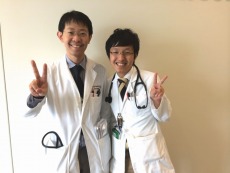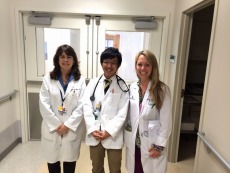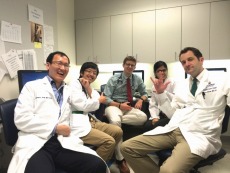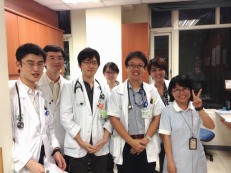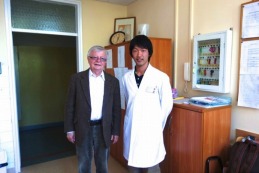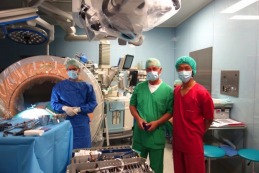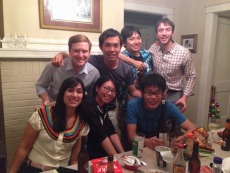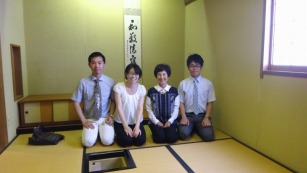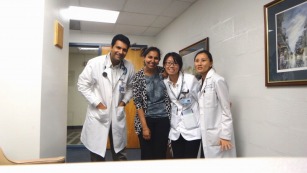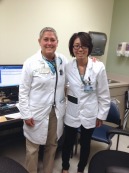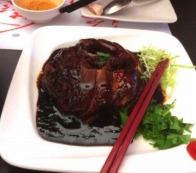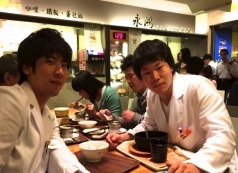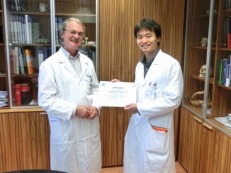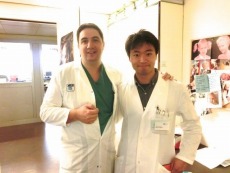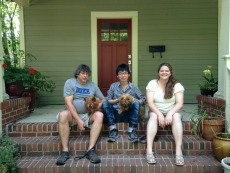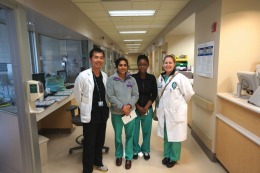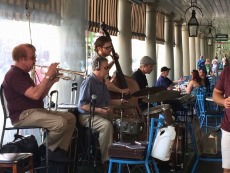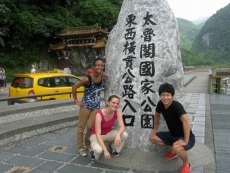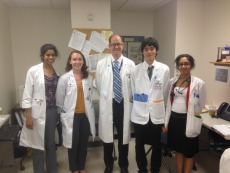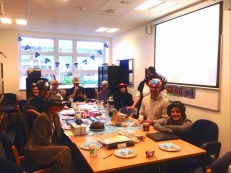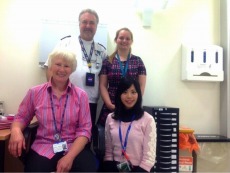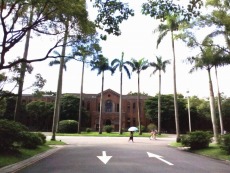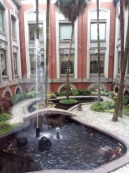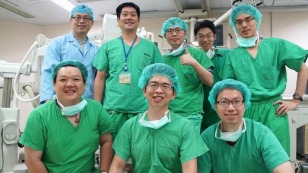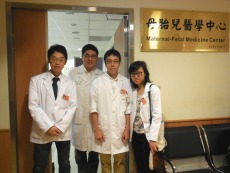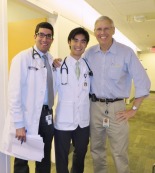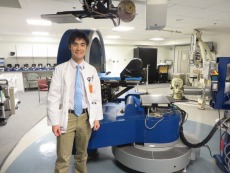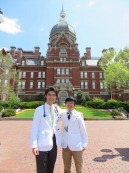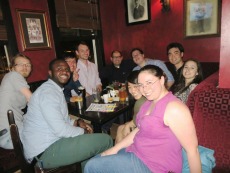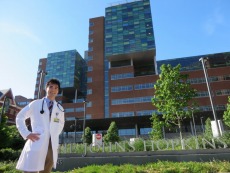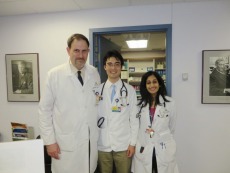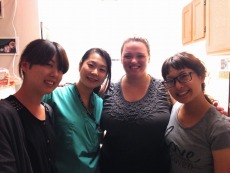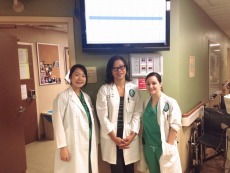Experience Reports (for Nagoya University Students) | 2014
- Shohei IYOSHI Johns Hopkins University, School of Medicine
- Tomoki INAGAKI National Taiwan University Hospital
- Hirofumi YOKOTA Tulane University, School of Medicine
- Hiroyuki KATO Medical University of Gdansk
- Kana TAMAKI Tulane University, School of Medicine
- Saeko TAKAMIYAGI University of Pennsylvania, School of Medicine / University of Freiburg
- Hideki SAHASHI National Taiwan University Hospital
- Kazuki YAMANE The Medical University of Vienna
- Daiki SHIBA Duke University, School of Medicine
- Daisuke KASUGAI Tulane University, School of Medicine
- Akiyoshi HOSHINO The Medical University of Vienna
- Yusuke ASAI National Taiwan University Hospital
- Shota TAKI Duke University, School of Medicine
- Shiori NAKAMURA University of Warwick
- Hiroyuki TANAKA The Medical University of Vienna
- Yutaro FUSE Harvard University MGH / Johns Hopkins Hospital
- Yuriko ARAI Tulane University, School of Medicine
Johns Hopkins University Clinical Clerkship Report
Shohei Iyoshi
In the Spring of 2014, I had the privilege of undertaking my practical training in pathology, oncology and cardiology at Johns Hopkins University, Baltimore, Maryland. Under the tutelage of the professors and students of this esteemed institution, I was able to learn much and gain valuable medical experience in these fields.
The reasons I chose to participate in this study abroad program are thus; firstly, I wanted to see how translational research (research that aims to make findings from basic science useful for practical applications that enhance human well being) is conducted in Top institutions in order to prepare for my future career in that field. Secondly, I wanted to improve competency with clinical skills, which I found to be lacking during my first training program last summer in Arizona.
During my tenure at Johns Hopkins University, I completed training in the Pathology research rotation, cardiology clinical rotation, and oncology clinical rotation, each for duration of one month. While I was studying in the pathology research rotation with Professor Goggins, I worked with him on his studies of the early stage detection of pancreatic cancer and helped his lab members with explaining clinical research to the patients, as well as with genetic analysis, and specimen preparation. Also I could have opportunity to attend the autopsy lecture delivered at The Maryland Chief Medical Examiner's office.
In my cardiology rotation, I worked in a cardiology consult team examining 5 -10 cases every day, with myself being assigned to 1-2 cases. In this capacity, I was tasked with the taking of the patient’s medical history, conducting physical examinations, and making case presentations to the attending physician. I also observed the cardiac catheter test round with the CCU and heart failure team and attended several fellow’s conferences.
During the medical oncology rotation, I worked as a member of the solid tumor inpatient service, taking medical history, conducting physical examinations, writing charts, giving full presentations to the attending physician during the rounds and doing everyday follow-ups. Having been assigned to patients with progressive stomach cancer, I was given the chance to elaborate on differences between Japanese and American treatments of this illness.
To conclude I would like to summarize my experiences in the U.S. concerning the goals I set for myself upon proceeding with this program of study. In relation to understanding translational research, due to time restraints, I was not able to conduct my own research as thoroughly as I would have liked to, however, through hands on experience, the academic atmosphere, the discussions between the basic scientists and the clinicians, I was able to gain a lot of understanding, in this field. In addition to that, I could also become acquainted with several MD-PHD students who will be conducting this research in the future and was able to become motivated by their passion for seeing advances made in medical science. By speaking with them, I gained insight as a medical student, learning more about my strengths and weaknesses, and also allowing me to consider my future career more carefully. In terms of my personal growth, I believe I have grown a lot since last summer, however, I still found it to be very challenging, and I have realized that there is a lot of room for improvement. In comparing the Students in their final year of medical education in the U.S. with Japanese students, I found that in knowledge and medical competency, Japanese students were lacking, thus encouraging me to make the effort to improve myself more.
This recent study abroad program has given me a lot of invaluable experience and I would like to thank all of the staff that supported us.
National Taiwan University Hospital Clinical Clerkship Report
Tomoki Inagaki
I had an opportunity to take clinical clerkships in National Taiwan University Hospital (NTUH), which is located in the center of Taipei, for 12 weeks from March 24th to June 13th. I often heard that Taiwan is greatly emphasizing medical education based on English as well as other Asian countries. Therefore, I have wanted to experience both the medical education and medical care in Taiwan to broaden my outlook through this program.
I rotated the Family medicine department for the first 3 weeks. There I belonged to the team consisted of attending, resident, PGY and went to see the patients with resident every morning. After visiting them, I made medical charts for each of them so that I could take feedbacks from doctors or ask them what I couldn’t get. In the evening, I was following the attending rounds. The days at Family medicine made me aware of how important it is to monitor such patients’ information as vital signs. For instance, I had a case in which one stable patient who was admitted for long time due to the systemic management for progressive cancer suddenly developed sepsis caused by liver abscess. This drastic change made me greatly shocked. Family medicine was covering widely from common diseases like dizziness and pneumonia to the background diseases like hypertension and diabetes. I was making efforts to try to understand what happened to the patients and how I should approach their symptoms or diseases. But, Something unexpected sometimes happened. I can remember the case where doctors and I faced the difficulties to clarify the cause of dizziness; either organic craniocervical disease or ischemia due to insufficient blood flow.
Three weeks at the otorhinolaryngology was spent to see the patients with the disease of otitis media with effusion, cholesteatoma, otosclerosis and so on. Except for these, many patients with oral cancer, buccal cancer and nasopharyngeal cancer were hospitalized, consisted with the Taiwanese culture of chewing beat nuts. As I told one attending doctor that I had an great interest in the research, he took me to his laboratory where I was taught how to perform immunohistochemistory strain or dissection of mice cochlea.
Then I moved on to the Oncology department, where I was in charge of the patients with a seventh year student for four weeks. They were often hospitalized due to the adjuvant chemotherapy after the surgery. I was focusing on the understanding of present illness, previous medical history and image data associated with the textbook as well as the latest knowledge. As for the medical examination, it doesn’t include aggressive clinical examination for diagnosing but for monitoring patients’ conditions concerning side effects of chemotherapy, from such general symptoms as nausea or anemia to drug specified ones. In fact, I suspected the patient had acute infection because of the worsen status, so that I wasn’t able to be aware of Fanconi syndrome, which was reportedly associated with ifosfamide. I felt this illustrated how important it is to know adverse effects of chemotherapy. Also, I followed the consultation and presented the gastric cancer to doctors.
I was instructed how to perform the central intravenous catheterization and tracheal intubation at the anesthesia department for the last 2weeks.On the outpatient department, I saw the doctor dealing with the patients suffering from the chronic pain due to the Fibromyalgia Syndrome or trigeminal neuralgia. I was always overwhelmed at any department by the fact that doctors were speaking English well and that the medical charts or the slides were all written in English. I’m sure this was brought by the intensive English education. I had a lot of opportunity to talk with students in NTUH and any student was able to communicate with fluent English in a dignified manner, which made me surprised and admired. As I understood not only the medical education in Taiwan but also the medical system and political issue, it seemed to me that Taiwan has been trying to absorb the system and the culture from Japan or the U.S while they are struggling against China.
When I think back these experiences, I find myself change the way of thinking. For example, I have gotten an attitude to go back to the brand-new knowledge when I face patients. The fact that English is used as a communication tool in one of the Asian countries than I had expected lead me to reconsideration of English. Moreover I’m sure this experience will give me a perspective when I will involve in the medicine in Japan in the near future.
This wonderful opportunity was brought to me by much support and cooperation from office of international affairs . I was thankful to Dr.Kasuya, Dr.Kondo (office of international affairs) , Mrs. Nishio (international exchange agency), empathetic doctors, students, clerks, nurses in NTUH and my family members. Thank you.
Tulane university Clinical Clerkship Report
Hirofumi Yokota
I decided to challenge this exchange student program when I was recommended it by one of the senior students who experienced it. Before that time, I spent almost all my free time thinking about the club activity. Thus everything I have come across since then is very new for me. Tulane University is located in New Orleans. This city is completely different from other cities in the USA, more like European cities. The three months I spent there were just wonderful.
First month, I did my clerkship in Hematology/Oncology department. I had been interested in that field for a long time, since Oncology is still new in Japan. It sees all kind of cancer in need of chemotherapy as well as hematologic diseases. I joined in the consult team. My duty there was going to see a patient when we received a consult and discussing the treatment with fellows. Moreover, I could join many conferences and have opportunities to check blood smears. Doctors in this department took a lot of time to see each patient. Such style was very nice for me to get accustomed to the American hospital.
In the next month, I chose pulmonary/ICU department. Generally, hospitals in the US have Oncology and Infectious disease department, so what pulmonologists do there is completely different from that in Japan. Tulane pulmonary/ICU has 3 teams in it: pulmonary consult team, medical ICU team, and sleep medicine team. I could have flexible clerkship, which allowed me to join all the teams, thanks to a Japanese attending Dr. Saito. In ICU, I had my own patients and went to see them every day. Going to see patients and making a presentation by myself were challenging for me, but this experience enabled me to have confidence. This month was busier than the first month. However, all people in the department including patients were so nice that I could learn a lot comfortably.
I rotated in two different departments in the last month. In the first two weeks, I was in radiology. All staffs there were so enthusiastic for students’ clerkship that they offered well organized schedule. I took lecture and joined the discussion of radiologic interpretations. The biggest difference in the clerkship between radiology and others is that I rotated there with about ten other students. Thus, I could learn not only from doctors there but also from classmates. It enabled me to make friends with many Tulane students. In many terms, I can say those two weeks were the most enjoyable days in my clerkship.
I spent last two weeks in Tulane studying Endocrinology. The clerkship there perfectly focused on clinics, so my duty there was taking physical exam of the patients. Since almost all patients had diabetes, of course with some exception like osteoporosis and thyroid disease, I could practice neurological exam again and again. It was a bit monotony, however, I learned more than I had expected from those patients because the professor and fellows were kind enough to give me feedbacks. Furthermore, I didn’t join clinics that much in the first two months, so it was good experience in that sense as well.
It was not in the part of the clinical clerkship, but was the most memorable event I faced in New Orleans that I visited Dr. Arimura’ s labo, who is a great researcher both of Nagoya University and Tulane University. He himself had already passed away, so we visited there with under his wife’s guidance. I could learn how attractive it was to do medical research in the US as well as its difficulty. That day motivated me to look the big world.
Through the three months, I gained so many things, in which a new point of view would be important for me. Before going to the USA, I had blind admiration for U.S.A. I thought everything done there was much more progressed than Japan. However, I could join and observe what they actually do, so I can see things objectively now. The relationship with new kind of people that I have never met must be another big gain for me. Japanese and Asian doctors and researchers there helped me both in the hospital and out of it. Tulane students were also very kind for me. They were the nearest teachers in the hospital, as well as playmates. Without them, I couldn’t have such wonderful days.
I am deeply grateful to all people supported me in many different ways. I hope that the connection between Nagoya and Tulane last forever and many students can have wonderful experience like me.
Medical University of Gdansk
Hiroyuki Kato
The reason that motivated me to apply this clinical clerkship exchange program is just to improve my English skill. I believe that speaking English without any difficulties is one of the most important things in our school days because English skill is necessary for doctors, whose work is globally connected. They need English not only for daily life but also for their professional fields.
At first, I was planning to choose an English-speaking country such as the US, England and Australia. However, I found that Poland is the most suitable place for my goal because the Medical University of Gdansk has English division. I could communicate with many students speaking English from all over the world in Poland, so there would be no difference from the other English-speaking countries. Furthermore, every kind of surgery department in this University Hospital has a large number of patients, so there would be many opportunities to experience surgical procedures. These two advantages (English-speaking environment and chances for surgical procedures) made me choose Medical University of Gdansk as a place to study medicine. I rotated in Cardiac Surgery, Family Medicine, Surgery and Neurosurgery there.
In Cardiac Surgery, I heard that they sometimes perform heart transplantation, but there was no patient during my rotation. It was a pity that I missed the opportunity to observe it. However I saw a lot of interesting operations because they had surgery every day. What impressed me the most was a serious operation: two coronary artery bypass grafts and aortic valve replacement. Doctors were kind enough to explain various things to me, so I was able to develop my knowledge.
In Family Medicine, I joined classes with English Division students. I had a variety of lectures in this department, such as Cardiology, Respiratory Medicine, Psychiatry and even Obesity. Therefore, I gained general knowledge on internal medicine. Moreover, because most of my classmates were American and they frequently asked teachers interesting questions as if the lecture had been a kind of discussion, I was able to join real American discussion in Poland. That was precious experience to improve my English and medical knowledge.
In Surgery, I joined many operations as an assistant and experienced many surgical procedures. The most impressive one was pancreaticoduodenectomy. The professor performed a lot of complicated procedures very quickly, so I was happy to observe the operation by the highly skilled surgeon. Gastrectomy for obesity was also interesting because it is rare in Japan but common in the Western countries.
In Neurosurgery, they had many operations for spinal cord, which are usually performed by orthopedist in Japan. I was interested in brain, so I asked the doctors to let me see as many operations for brain as possible and they did. They let me experience hemostasis and suture while opening and closing the head. Biopsy by neuroendoscope was very interesting because that was my first time to observe neuroendoscopy.
After I spent 12 weeks in Gdansk, I found I had got the most valuable experience in my life there. Communication with English Division students let me improve my English dramatically. They had various accents because they were from all over the world, so I had difficulty to talk with some of them from time to time. However, now I understand the importance of this experience because English is not a single language but many different languages spoken by many different people. This idea would be helpful for my career in the future.
In the end, I would really like to appreciate to all the people who gave me such a great opportunity, especially to Dr. Kasuya, Dr. Kondo and all the staff of the International Affair Office of Nagoya University, Prof. Woźniak and Prof. Wakabayashi, who started this international communication between Nagoya and Gdansk, and all the people who helped me at Medical University of Gdansk. Thank you very much.
The Experience Report at Tulane University in New Orleans
Kana Tamaki
For my final year curriculum, I decided to challenge to join in clinical clerkship in the US and got the chance of studying at Tulane University School of Medicine. This experience spending 3 months from April to July in New Orleans, the city of Jazz, is one of the great opportunities for studying medicine but also my life.
My rotation in the US started in Nephrology department. I belonged to nephrology consult team that took care of inpatients who were consulted by other department because of some kidney or electrolytic problems. Everyday I was in charge of 1-3 patients and required to join in round and present my cases in front of attending doctor,fellow doctors and residents. I had to finish checking medical records, history taking and organizing presentations before the round. At first, it was difficult to deal with those daily tasks, but all doctors always taught me with patient and kindness. Therefore, I could learn a lot about managements of chronic kidney disease, acute kidney injury and dialysis. I also had opportunities to join in study conferences and lectures.
I rotated in Allergy, Immunology and Reumatology department on the 2nd month. On this rotation, I mainly observed out patient clinic and learn outpatient management of asthma, allergic rhinitis, dermatitis, food allergy, common variable immunodeficiency, specific polysaccharide antibody deficiency syndrome and so on. Although I didn’t had chance to interview patients, attending doctor always asked me question or opinion at the team discussion and gave me feedback for each case. Also, because I saw a lot of common disease and visit primary care clinic every week, I could experience environment of American primary care site on this rotation.
The clerkship on my 3rd month, I rotated CCU/Cardiology consult team and radiology department 2 weeks each. On the cardiology rotation, I followed a team which was composed of a 2nd year regident and an intern and managed inpatients again. Because most of patients who we took care complained chest pain and visited ER, I got some chance to interview patients on ER. Radiology rotation was different with other rotations. On this rotation, Students rotated X-ray, CT, MRI image reading rooms or intervention radiology and reading medical images with fellow doctors everyday. Radiologists require to acquire not only image reading skill but also knowledge of diseases and treatments. I was really impressed doctors’ broad and deep knowledge of medicine. Since I needed to study thorough anatomical and clinical knowledge to answer doctor’s questions, I keenly realized that I had to study harder. During this rotation, I also had lectures everyday and it was mandatory to pass the exam and give a case presentation on the last day during. Because this was my first time to present case in English, it was great opportunity for me.
Thus, through this clinical clerkship, I could get a lot of medical knowledge and skills to work at American clinical site, such as taking interview, joining in discussions and giving a presentation in English. Also I could experience American medical system that has many differences with our system. This experience made me rethink the state of Japanese medical system. Moreover, what is the great gift for me in this experience is that I can meet a lot of wonderful people, such as great doctors, students and hospital and other staffs. I’d like to study harder and became good doctor but also person using this experience.
Finally, I really appreciate all the people who supported me through this exchange program, especially professors and staffs at Nagoya University School of Medicine and Offices of International Affairs, doctors and students at Tulane University School of Medicine, my families and my friends.
Clinical Clerkship in University of Pennsylvania
Saeko Takamiyagi
The first two months of my last year in medical school, I had a great opportunity to do my clinical rotations in University of Pennsylvania. The two months I spent there was a whole new experience and full of excitement and learning.
University of Pennsylvania is the oldest and one of the finest medical schools in the United States and has several related hospitals. All of them have high level patient care, education, and research programs. It was my great pleasure to join the clinical rotation at Pennsylvania Hospital which is the first nation’s found hospital, and The Children's Hospital of Philadelphia (CHOP) which is the oldest and the best children’s hospital in the United States.
My first rotation started from NICU in Pennsylvania Hospital. I still cannot forget the striking feeling on my first day. There were 40 tiny babies with severe diseases connected with lot of tubes and I had no idea what I can do for them. My attending doctor gave me a job to follow two babies for a month. I took their physical exam every morning and check the overnight events. I wrote progress notes about how they are growing, eating, and excreting, and reported them in the presentation during the rounds. My very first presentation was so faltering and my head went blank when the attending doctor asked me, “So…what do you want to do for her today?”. However, few weeks later, I realized that there are a lot of things I can notice watching the babies every day. Their growth, tolerance to the feeding, and reaction to the treatment were remarkable. At the last part of my rotation, I could make my own assessment and plan and the doctor let me conduct it. I felt so accomplished when my baby are graduating NICU, I felt like I somewhat contributed to her new beginning of life.
The next rotation was in Pediatric Infectious Disease department in Children's Hospital of Philadelphia (CHOP). Here, I belonged to a consult team with a 4 year medical student. To my surprise, US medical students are required to be greatly involved in clinical practice as a team member. So I also had lots of opportunities to see patients by my own in the first line, write consults notes, and present it in the rounds. In the rounds, doctors always gave me several questions and great amount of feedback. Everyday was full of learning and stimulation. I was truly one of the team members and felt so happy to contribute the team. My attending doctor gave me a great word at the last day of my rotation, “You did so well. It was so nice having you.”
Through this experience, what I gained are wonderful encounter with amazing people and my own growth of becoming more autonomous and self-confident. During this two month, I met a lot of people who changed my point of view. Doctors were excellent, intellectual and humane. I learned a lot of ways of making good relationships with patients and coworkers. Medical students were so hardworking and ambitious, which inspired me so much. Japanese doctors who work there, especially Dr. Nisisaki and Dr. Kanei, gave me eye opening advice for my future. The roommates in my dormitory was also awesome, they were all kind and funny. Thank to them, I had a wonderful time even outside the hospital. However, in other to obtain such a great time with them, I always had to move by myself to some extent. It was my first experience to become a “minor” presence as an Asian in foreign country. Although there are many friendly people who accept you easily, it is always required to be active to fit into a new community. This gave me a lot of strength, confident and growth as a human.
Finally, I’m so grateful to all of the people who supported me for this magnificent opportunity. Especially, Dr.Kasuya, Dr.Kondo and every staffs at Nagoya University and University of Pennsylvania. This two month was the most fruitful and influential time ever. Thanks again, and hope this precious program will continue to prosper for the ambitious future juniors.
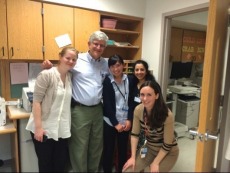
The Children’s Hospital of Philadelphia(CHOP)
Pediatric Infectious Disease Consult Team
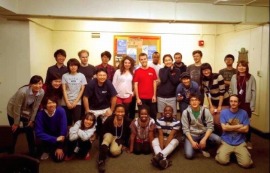
At the dormitory “International House Philadelphia”
National Taiwan University
Hideki Sahashi
I spent 3 months to take part in the clinical clerkship at National Taiwan University. It was really a sensational and stimulating experience for me. I would like to report what sort of training I had in the department of Dermatology and Plastic Surgery.
My first rotation was Dermatology. Here, there are a lot of good things impressing to me. In Japan, one doctor diagnoses and writes a chart at the same time. This makes doctors busy and they sometimes do not have enough time to explain to patients, which leads to anxiety of patients. On the other hand, here different doctors diagnose and write. So doctors can make a polite explanation to their patients. Compared to Japan, doctors are kind to patients. As for disease, livedoid vasuculopathy is very rare in Japan and I have never seen it, so I am satisfied to see how it is like. In addition, there are more patients suffering from psoriasis here than in Japan.
My second rotation was Plastic Surgery. I think that plastic surgery at NTUH treat with various cases. For example, amputation and bypass operation of diabetic foot is performed at angiosurgery in Japan. What is more, operations of oral cancer are performed at Dental Surgery. Also I am surprised to know that there are more patients suffering from oral cancer here than in Japan because of betel nuts. So I am very happy to see these two cases because in Japan I have to round these two departments.
On the whole, every doctor speaks English fluently in Taiwan. Case conferences and lectures are held in English, so I am not in trouble when talking to them and doing my clerkship. So I highly recommend studying Taiwan. What is more, people are very kind and there are a lot of places to going sightseeing. I am sure that experiences there give precious moments.
Finally, I would like to say thank you very much to all people associated with my exchange, Especially Dr. Kasuya, Dr.Kondo, Ms.Nishio. I can assure that all experience and friends I had during the stay is my treasure, thanks to you all.
The experience in Medical University of Vienna
Kazuki Yamane
I took part in the clinical clerkship at Medical University of Vienna for 3 months. The reason why I applied this program was that I would like to feel and know different values and medical systems and to challenge creating new human relationship at the place where I don’t know completely. I rotated at 3 departments (the cardiac surgery, neurosurgery and emergency medicine).
At cardiac surgery where I was during first month, I realized and surprised at the difference of medical education system between Japan and Austria. The number of students at each grades is more than 500 at Medical University of Vienna and it is much more than Japanese one. Therefore students are required to learn of their own accord. Additionally, some duties were assigned to medical students such as collecting blood sample, recording ECG. I had never experienced doing those medical procedures to real patients during my clinical clerkship. For the first time, I was terribly nervous not only because of the lack of experience but also because I had to do such procedures to patients who could not speak even English. But, finally I had become not to get so much nervous at the end of rotation at the department. This experience gives a lot confidence and teaches me “the important thing is to just try it”.
My second rotation was neurosurgery department. I went through some great things there. I could observe a few operations everyday and got some small lectures from doctors. Sometimes I was allowed to take part in operations and support doctors. Because I would like to become a neurosurgeon in the future, I felt so excited and much pleasure. I also could have chance to take history from patients who can speak English. After taking history, I discuss about the case with doctors and develop my understanding. Furthermore, I was given a great opportunity of making presentation in English and I did it at the morning conference in front of the all doctors at the department. After the end of my presentation, some doctors came to talk to me and say “good job”. This memory is one of the most wonderful ones during my stay in Vienna.
My last clinical clerkship in Vienna was emergency medicine department. I joined the team which is responsible for walk-in patients. But, I was also allowed to observe the treatment for patients who came to the hospital by ambulance. Same as the cardiac surgery department, I took blood sample and recorded ECG. And showed these results to the doctors and discussed about them. At that time I could feel that I had progressed in some points such as German skill. Because I spent more than 2 months in German speaking country, listening to the conversation between doctors and patients, I couldn’t still understand each words or phrases in German but I could do what they are talking.
As mentioned above, I could learn a lot of things at the hospital. But, I also learn so many things outside of the hospital. During these 3 months, I got to know many people, students who studied at Medical University of Vienna and came from other countries to study medicine same as me. Making friends with them only by communicating in English is priceless experience for me.
I am sure that everything I experienced will be very useful for my future. I really appreciate to everybody giving me such a precious opportunity and supporting me in every respect: Dr.Kasuya, all the staffs working in the office of International Affairs at Nagoya University and all people I met in Vienna. Thank you so much.
Duke University clinical clerkship report
Daiki Shiba
First of all, I want to say thank you to everybody who supported me during the exchange program. Fred and Jenifer, who made us stay in Durham for two months, were really nice and kind. We enjoyed the baseball game, home party, and international food party with them. Thanks to Dr. Kasuya and Dr. Kondo, I could manage to finish the program without any troubles. Plus, I want to say big thank you to Shota. My life in Durham became much brighter by living, cooking, and talking with him. Lastly, I appreciate to my family who are always thinking about me.
Duke University is located in Durham, North Carolina. In 1924, tobacco and electric power industrialist James B. Duke established The Duke Endowment, at which time the institution changed its name to honor his deceased father, Washington Duke. At the beginning of summer, there are many greens and beautiful flowers in and around the campus. Pool, tennis court, football court are also in the campus, and people are singing the praise of this wonderful season. My living place is 15min away from the campus by bike, and the area is safe, calm, and good for concentrating on studying. If you like rural place surrounded by nature, I strongly recommend you to study in Duke University.
In the clinical clerkship, I rotated Pediatric Infectious Diseases (Peds. ID) and Neurology department. In Peds. ID, I took consults from other departments. Then, I went to see the patient, took a history, did the physical examination, and presented the patient to the other team member. Medical students were required to do the full presentation including the assessment and plan. The team member started the discussion base on medical student’s information, so I felt a lot of responsible. In Japan, this never happens and what medical students can do is really limited. At the beginning of the rotation, these tasks made me really nervous, but later it turns out to be a challenging thing. In a month, I saw RMSF, Kawasaki disease, febrile neutropenia, mother to child HIV prevention, septic arthritis, fetal hydrops, line infection and so on. We cannot see such a lot of pediatric infectious disease cases in Japan. RMSF and mother to child HIV prevention were totally first experience for me. I appreciate to the doctors in Peds.ID who gave me a lot of chances.
In neuro department, I rotated the both General neurology and Neuro-ICU (Stroke Unit). I used to be interested in general neurology dealing with neurodegenerative disorder, but in Stroke Unit, I realized how interesting the acute stroke management is. The attending doctor in Neuro-ICU was really educative. He asked a lot of questions to team member during the round. His questions ranged from the basic science to pharmacological knowledge. In this rotation, I learned several important clinical trials related to stroke management such as CHANCE, SPARCL, and PREVAIL. I have never experienced such a good education during my med-school life.
Duke University is one of the most academic educational institutions in United State. All the researchers and doctors are prestige and selected few. The biggest thing I achieved in USA was that I could make a long lasting relationship with not only doctors in Duke but also doctors all over the United State. I’m certain that the people and thoughts, which I experienced in two month, had the great impact on my future career. Thank you very much again for all the people who gave me this wonderful period.
Tulane University Clinical Clerkship Report
Daisuke Kasuga
During the first month, I was in Surgical ICU, which is one of the subdivision of surgery department.In The SICU, patients seems to be admitted if they are post-surgical status and may have a chance of change in Vital signs. Doctors belong to SICU have to manage patients from a wider perspective. This ICU is not closed ICU, so for example we don’t see neurosurgery patients. If the patients are seriously illdd and may need immediate surgical intervention, they would admitted to Trauma ICU.
In this department, I usually wake up 5:00 - 5:30 a.m. and go to pre-round everyday. I experienced daily oral presentation for the first time in my life. In Japan, I did some case-presentation but once in a week or less, so this was a good opportunity for me to get accustomed to the standard way of presentation in ICU. Residents are so kind that they willingly checked my presentation draft and gave me some feedback. Dr. Maede, the attending doctor of SICU, gave me a lecture everyday. He chose one topic from the round, such as septic shock, pulmonary artery catheter, and so forth. All of them are student-centered lectures and useful.
Next month, I rotated endocrinology department. I usually join the clinics; This clinic is very similar to the Endocrinology clinic in Japan. That is, most patients are type 2 DM, and sometimes thyroid disorder. I even see one Japanese patient who has a Basedow disease!(I did medical interview in English although) so, I felt somewhat unique but strange feeling during this rotation. I also felt the difference in the insurance systems between U.S. and Japan; some type2 DM patients didn’t afford the first-line drugs because they don’t have insurance. This would never happen in Japan. When I saw diabetic patients in Japan, they are tended to be optimistic in spite of the typical character of japanese. In the New orleans Diabetic patients are welling to try excersise and want to loose some weight; they looks desparated in spite of the typical character of people in New orleans(cheerful and optimistic).
The last month, I experienced 2 departments - Neurosurgery and Pulmonary/MICU. Neurosurgery department is one of the most competitive department in the united states. I usually get up 4:30 and go to work around 5:00 a.m. I gradually got an useful habit of getting-up-early-in-the-morning and so now that I have a confidence in staying punctual in the morning. Pre-rounds usually start from 5:30, so I have to check the Ins/Outs and other important information of my patients before that. Residents told me that the more I become of help to the team, the more I can participate in this clinical clerkship. Although most surgery cases are spine disorder, it was very fruitful. The last two weeks, I was in Medical ICU. pulmonary doctors take care of this department. Most of the patients in the MICU are very complicated, hard to figure out the pathophysiology, but I had no dificullty in finding topic to learn during this department. Every thursday afternoon, I joined chest conference and journal club.I learned how to read the latest article to some extent.
Overall, My experience in Tulane university was very fruitful.I really appreciate every support from Dr. Kasuya, Dr. Branko, the Office of International Affairs and especially my family.
My Clinical Clerkship and Research Elective at Medical University of Vienna
Akiyoshi Hoshino
I attended the clinical clerkship at Medical University of Vienna (MUV) of Austria, as an international medical exchange student from Nagoya University School of Medicine, from Mar to June, 2014. Vienna has a long history from the ancient Roman era and developed as the capital of the Austrian Empire under the Hapsburg Rule for over 700 years. After World War II Vienna lost its political position, but nowadays the city has regained its former international stature by hosting several international organizations. Vienna was also ranked first in its annual "Quality of Living" survey of hundreds of cities around the world, as well as the global sightseeing city.
Medical University of Vienna, previously University of Vienna School of Medicine, was founded by Rudolf IV von Habsburg, Duke of Austria in 1365 as public university in Austria, and is known as the oldest university in the German-speaking world. The journal “Times” ranked Medical University of Vienna as 36th in the ranking of the Top 100 Universities in 2014. The general hospital in Medical University of Vienna, so called AHK (Allgemeines Krankenhaus) is a huge hospital of 36 clinical units with 2134 beds.
Here I want to report my study and experiences in Vienna. In my clinical clerkship, I requested to study both two programmes, namely clinical clerkship and medical research elective. I learn in three departments of neuropathology, Pediatrics at children’s hospital, and rheumatology.
For the first five weeks I rotated in Pathology department of the Clinical Institute of Neurology. I joined neurodegenerative disease team to learn both pathological diagnostics and its related research. I attended the 40 cases of brain autopsy with the patients of several types of dementia including AD, FTLD, DLB, PD, as well as neurodegenerative diseases such as PSP, CBD. The conferences about CT and MRI were also useful for me to integrate my knowledge among histopathology, macropathology, diagnostic imaging, and clinical diagnostics. I am grateful to Prof. Hainfellner for his effort to taking me in his lab and treating as a visiting researcher.
Next I moved to the St.Anna Children’s Hospital. I rotated in the department of Hematology/Oncology at the research institute, annex to children’s hospital. I was assigned to the cancer immunotherapy team of research institute, composed of pediatricians and medical researchers. Half of members were female and also foreigner people from Hungary Italy and Spain. One of the most impressive episodes there is that I had the chance to join the “Public Open Night” of the research Institute. The public open is a chance for people to come observe the laboratory learn some innovative therapy as well as basic knowledge of diseases, and also is a chance for institute to earn donation for research activity. Indeed in Austria, social education for children is highly promoted. I feel very impressed to the efforts and aggressive approaches made by Austrian people to educate the children. It was so hard for me to communicate with children who can not speak English. However I found that nonverbal communication is much more important especially for the medical care and examination for pediatrics.
I spent my final two weeks at Rheumatology in the Department of Internal Medicine 3. I belonged to the inpatient care team, consisted of four residents with an attendee. My days in Rheumatology were full of hardships, because all the practices were performed by German. What I felt hard is that I could not read or write any clinical charts which were written in German in handwriting, therefore I could not follow what the senior doctors discussed. Instead, the attendee provides me a great amount of physical examination; every morning I need to perform collecting blood, infusion, insert intravenous cannulation, measuring ECG, ultrasound and their related examination for thirty patients. It’s a great experience for me to perform several physical examinations which are not allowed by students in Japan.
Participating in the clinical clerkship in the Medical University of Vienna was one of the most precious experiences in my life. I deeply appreciated to all the people who associated with my joining the exchange student programme and my studying abroad. I am grateful to the attending doctors, fellows, resident doctors, students, and the exchange program coordinators at Medical University of Vienna. I also thank Prof. Kasuya, Dr. Kondo and Ms. Nishio, and all the staff of the exchange student training course and Office of International Affairs at Nagoya University School of Medicine.
Vielen Dank!
National Taiwan University
Yusuke Asai
I'd been studying at The National Taiwan University for three months, which is located in the center of Taipei. The NTU was established in1928 as one of the former imperial universities by colonial Japanese government and is 10 years older than Nagoya University.
I arrived at Taipei in March. At that time, there was a huge protest demonstration against government at hundreds meters of distance from the NTU hospital and our dormitory, and hundreds of police were standing ready around there. What made me surprised was that the police were eating lunch box or enjoying LINE with their smart phones while working. I saw the cultural difference with my own eyes. Thus, my life in Taiwan started.
I mainly studied at National Taiwan University Hospital (NTUH), which is a 10 minutes walk from the Taipei Main Station. NTUH is a huge general hospital with 2300 beds, composed of four 15-story buildings, outpatient building, and independent pediatrics building. I rotated general medicine, surgery, and dermatology here.
In general medicine department, I mainly attended the ward rounds. Since Taiwan is a multiracial nation, patients speak various languages such as Chinese, Taiwanese, and aboriginal languages. Although I'm not skillful at these languages, doctors and students there spoke fluent English and translated what patients said for me, which helped me a lot.
While rotating the surgery department, I had a lot of opportunities to observe operations. Probably because of the national character of a southern country, the atmosphere during operations was so relaxing; doctors and nurses were chatting during operation, even discussing about a trip plan of a nurse who were going to visit Japan for sightseeing. I felt really harmonious air.
At dermatology department, I was allowed to attend any kind of activities such as ward rounds, out patient clinic, and operations. Thanks to it, I was able to cultivate a better understanding about dermatology. Although NTUH is a university hospital, it deals with aesthetic dermatology. A lot of young females came to hospital for their acne, which impressed me a lot. In this department, I had chance to give a presentation about Japan at conference. What surprised me most was its open atmosphere.
The electric medical records were all in English at NTUH, and the textbooks the students used were all in English. I couldn't help feeling that they were going a step ahead of most of the Universities in Japan.
I had a lot of opportunities to communicate with local students.
Taiwanese students were open, kind, and easygoing people and they are considerate towards other people. Many students were from other countries such as Hong Kong, Singapore, Malaysia, and other Asian countries. They said they decided what to study first, and then chose universities globally.
The foods in Taiwan were splendid. Papayas, mangos, bananas, and pineapples of a southern country were so sweet and delicious. Among them, papaya was incredibly great when mixed with milk. One of the species of sweet potato, Taro was also delicious, and I enjoyed tasting as it was, mixed with milk, and fried with batter coating. 鹹豆漿 is a local common dish for breakfast, they put into soymilk soup base green onion, sesame oil, a fried food called 油條, and soy sauce. All of the ingredients harmonized well and tasted so good. Also I enjoyed one of the well-known Taiwanese dishes, 小籠包. There were wide varieties of 小籠包. One with tasty meat juice, light one which is good for breakfast, one you can get at an affordable price around 30 yen and enjoy as snack, and so on.
Also, I had a lot of chances to communicate with local people through playing soccer, surfing, talking about our history. They admit the difference of ideas and the ways of thinking, and believe that they should express what they have in mind honestly. They looked so relaxed. Spending time with them, I came to realize the existence and the shortcomings of the old Japanese Systems such as seniority system. On the other hand, I came to understand the beauty of Japan such as the four seasons, diligence of people, politeness, traditional culture, architectures, and Japanese dishes. At the same time, I made my mind to adopt what I think was good from other countries or cultures.
All in all, this three-mouth experience gave me a lot of perceptions about medicine, cultural difference, and the difference of climate and natural features. I am deeply grateful to Dr. Kasuya, Dr. Kondo, Ms. Nishio, the doctors of the Frontier, everybody I met in Taiwan, and all the fellows studied hard together.
Clinical Clerkship in Duke University Hospital
Shota Taki
I had stayed in North Carolina and practiced in Duke University hospital for 2 months. After this great experience, I just wondered what the biggest difference is between before studying abroad and after that. I learned medicine of the U.S. mainly by books and sometimes by documentaries. However, I don’t have what the U.S. medicine look like specifically and concretely. I thought I obtained clearer image of a goal to be an ideal doctor through this opportunity.
I remember the first week in a stroke team of Neurology vividly because it was impressive and hard for me in some points. In this rotation, I mainly have patients in a ward and do a presentation of the patients in rounds every morning. Because of the difference of the form of presentation, it was very hard for me initially to make it well. The hardest part of the first week was 25-minutes presentation. An attending doctor suddenly told me to do the presentation of subarachnoid hemorrhage verbally for 25 minutes, and I was really upset because I never did such a long presentation even when I was in Japan and have only a day to prepare for that. I struggled to make a good presentation that day, but couldn’t find out how to do that. Eventually I spoke a dull explanation like a textbook. Listening to a presentation a student of Duke made, I realized that the important thing is to provide an interesting and up to date information and to share it with doctors through discussion.
I got accustomed to doing presentation over 1 month clerkship, and then I had a rotation in Pulmonary medicine in the 2nd month. The most impressive part of the 2nd month was reading a lot of papers and having discussion about those. An attending doctor in the rotation always had curiosity about questions in clinical situation. Then, he looked for an appropriate paper which solved the problems and showed that to me. I needed much time to read through those every time, but it made me feel fascinated with up to date knowledge. Because I keep practicing reading a large amount of papers, in the late part of this term I could do much better presentation than that for the first time.
Through the entire clerkship I realized education of a medical school in the U.S. always put emphasis on curiosity and discussion to find a rational answer to a problem. I think that curiosity is the most important to start to learn something new. In Japan we have to suppress a personal opinion to progress something smoothly from time to time. It works well when there are too many works to do. However, it can be obstructive to produce a new idea, such as new treatment and new disease concept. Thus, it is necessary for everyone to have right to speak out a question from the curiosity to develop medicine. In addition to that, a quality of discussion is also important to discover an answer effectively. Keeping rights for everyone to speak out and conveying something in a way that is easy to understand are indispensable to improve the quality. I felt that not only I improved a skill of these during the stay but also learned a way to keep improving that.
Overall, I was confused the difference of the education between countries initially, but because of that I learned numerous things and obtained various perspectives which will not be able to get unless I study abroad. I was sure that this experience will remain in my heart forever. I would like to say “thank you” to everyone who supported this precious experience.
My clinical clerkship at Warwick University
Shiori Nakamura
I got a chance to study at University of Warwick for 12 weeks. I studied at both the hospital and the university. It was hard to get the student visa to go to England. I really appreciate many supports from various people. I would like to report my experience.
First of all, I learned both merits and demerits of NHS. NHS is a medical system of England. In England, all people can take medical treatments for free by registering for GP. When they feel sick, they have to see GP for their primary care, except for emergency cases. GP is a medical doctor who provides comprehensive general care to patients, rather than focusing on a specific organ system. Then, patients can go to big hospitals and see specialists. Doctors working at the hospital were proud of the system in that everyone can take treatments fairly. However, they said that NHS needs much money to keep it. They were also concerned that patients have to wait for a long time before seeing specialists. I worried that the system might reduce the number of patients who can completely get well. The owner of my staying private lodge had a father-in-low, who had recently pancreatic cancer. She said that the medical system of Japan is better than NHS because patients can get treatments quickly even if it costs more. She insists that taking a long time before treatments is very stressful for patients and their family. I took a good chance to think about the ideal medical system from various point of view.
Secondly, I was surprised at how different treatments are between countries. I wrote a report about Simvastatin at the university. Though I tried to compare pleiotropic effects report between of England and of Japan, it was difficult because average dose of simvastain in each country are too different. I learned that the ways to treat patients are different even if we can share medical information such as article all over the world. I couldn't explain why doctors in Japan don't prescribe Simvastatin more positively than in England. I learned how important to get information by myself.
I couldn't do anything without tremendous supports. I felt a lot of anxiety before I came to England because I had no friends studying together in England. However, I got a lot of precious experiences during three months. I'd like to appreciate all of them, especially Prof. Kasuya, Prof. Singer, friends studying together, and my family. Thank you very much.
Clinical clerkship in National Taiwan University
Hiroyuki Tanaka
First of all, I would like to express my gratitude to all of you who kindly supported my challenge in National Taiwan University Hospital (NTUH). It was a great opportunity to study there. I had a precious experience I've never done in Japan.
I have studied for three months at NTUH. The predecessor of National Taiwan University (NTU) was Taihoku Imperial University, which was founded by Japan in 1928. Even now, in the campus, we can see the old buildings built by Japanese at that time. When I was walking the campus, I felt a nostalgic sense. Taiwanese people cherish these old buildings and enjoy walking around in the beautiful campus, which reflect the good relationship between Taiwan and Japan. I think such a good relationship among people in the two countries strongly supported my study in Taiwan.
I first tried to take some courses related to internal medicine. However, there was a recommendation by NTUH that foreign students should take courses related to surgery such as general surgery, anescesiology, obstetrics and gynecology (OBGY), and urology, because foreign students may have difficulty in the communication with patients in Mandarin. As for communication, Taiwanese students are accustomed to the communication with foreign students and are very good at speaking English. When I was allowed to join the group of Taiwanese students doing clinical clerkship, I could, though only partly, take part in the communication with patients with their help. Though it can be a burden for NTUH and the students, foreign students are able to take part in many aspects of clinical activities with their help.
Now, I would like to write on my activities in three departments. I took surgery and OBGY and urology course, for one month each. In the surgery course, I was assigned to the plastic surgery department. Basically, I observed many operations. Many reconstruction surgery of the face after buccal cancer was conducted, which reflect the Taiwanese culture of enjoying the betel nuts. Betel nuts are sold everywhere in Taiwan, and I met some people who had tried it. In the OBGY course, it was lucky for me that I had opportunity to study with some 6th year students. During this period, I could know their international-mind and their attitudes toward medicine. They have a small barrier to the information written in English. They are good at referring to the English textbooks and websites. They might have been doing a training of using English as a practical tool. I could also see an outpatient clinic and a private clinic in Taipei city. In the urology course, other than the observation of the operations, I could attend the training of surgery for the residents. They energetically did training, and at the same time, they were enjoying it.
I felt that each country has its good point. In Taiwanese hospital, the doctors were communicating with each other frankly in the large voice, which made a good mood in the hospital. Such a good mood seemed to promote their activity. And the nurses were also frankly communicated with doctors. Such a smooth communication among medical staffs will eventually lead to the safety of medical practice and a good environment for the medical staffs as well.
Finally, I would like express my gratitude to all including Dr. Kasuya, Dr. Kondo and all members in International Exchange Program and Education Affairs Department. Thank you very much!
The Treasures That I Found In Boston and Baltimore
Yutaro Fuse
The three-months experience at Harvard and Johns Hopkins Universities is definitely an unforgettable, precious memory of mine. I would like to share my experience with you from three perspectives: rotations in the hospitals, life in the cities, and people that I encountered with.
Let me start with a little explanation about Massachusetts General Hospital (MGH), where I studied at the first month. Harvard University has an affiliation system. More than 10 hospitals in and around Boston have an affiliation with Harvard. MGH is the biggest institute of them. I had a chance to do a clerkship at MGH Radiation Oncology Department.
Most of the time was at the attending clinic. Although I was not familiar with radiation therapy before visiting there, they expanded my knowledge of radiation treatments to a much deeper degree. I was also able to try dosimetry with dosimetrists and to observe treatment done by technicians. These experiences enabled me to grasp the notion of “ treatment by the team” at that department.
The next two months were at the Johns Hopkins Hospital (JHH), medical oncology and endocrinology departments. The services that I took part in at these two departments were quite different; I was at inpatient service at medical oncology and at outpatient clinic and consult service at endocrinology.
As a large cancer center institute, patients from all over the world gather to the JHH oncology department. Most of them are treated at the oncology outpatient clinics, but some of the severe cases are handled at the inpatient service. These are the patients that I was assigned to. A typical day started with pre-round, presentation at rounds, conference, management of the admitted patients and ended with studying with up-to-date.
Final rotation was done at the endocrinology department, which was scheduled with morning outpatient clinic and afternoon consults. Both services required medical students to see patients by themselves, to present H&P, A&P in front of the attending, and write patient notes which were to be revised by the attending physicians. Through the training program, I learned not only knowledge about endocrine diseases but also skills of H&P, of structured notes, and of delivering a nice presentation.
In addition to the experiences that I had inside of the institutes, I would like to share the experiences outside of the hospitals.
I love Boston. It is an accessible, safe, and historical city. The only downside is the price of the apartments. Otherwise I had no complaints. You can go anywhere by its subway called “T” and there are several good supermarkets. On the weekends you can explore the historical places in the city.
Baltimore is another fascinating city. It is a harbor city with beautiful places to eat at. It is also close to Washington D.C. There is one huge problem surrounding the city, which is the safety especially around JHH area. If you go to JHH, it is advisable to be extremely vigilant. Even taxi drivers avoid passing through these areas. But overall it is a reasonable, nice city.
Finally I would mention the connection that I got with the people there. In general, people in the U.S. are friendly. Starting with doctors and medical students that I worked with, I became friends with a lot of people there. The more conversation we had, the more I realized that individuality and diversity lie in the hearts of the Americans. To be sure there are numerous ways of looking at things and they respect each other's thoughts. They remind me of the importance of expressing my own ideas clearly.
Overall the experience at Harvard and Johns Hopkins was beyond satisfactory. Yes, it is indeed a treasure to me. The stay in the U.S. let me compare the possible future paths in Japan and in the U.S. Furthermore I could observe the life of the doctors' lives in two of the best hospitals around the world, which gave me plenty of ideas and tips about how to improve myself during residency and even after.
Without help, I could not have been to the U.S. as an exchange student. After I was far away from home I again realized how much support people around me have been giving me. I would like to thank all the doctors, school officials, friends, and my family.
Experiences in Tulane University
Yuriko Arai
This year, I became 6 grades in Japanese medical school and had an opportunity to do clinical clerkship in another country for 3 months as an exchange program. I chose Tulane University in New Orleans. It was because the senior students who went Tulane University last year had brilliant faces after that. I wondered what made them so shinny, and decided to go and find the answer by myself. It was first time for me to go to the U.S.A. and live in other countries. So I was excited so much and the three months flew so quickly. But only three months made me live one day at a time.
I rotated in Cardiology, Urology, and Obstetrics and Gynecology.
First rotation was in Cardiology. I was assigned to join CCU team. The doctors in CCU see the patients who have emergency problems in their hearts. My goal in CCU was to master the differential diagnosis with chest pain. With chest pain, patients had a lot of reasons for these pains. These included emergency diseases such as acute myocardial infarction, aortic dissection. On the other hand, some had gastrointestinal diseases or musculoskeletal diseases. At first, it was really tough to ask clinical questions for patients and make the presentations for attending in English. In addition, the questions about uses of illicit drugs were awkward for me. In Japan, the numbers of the patients who use these drugs are not so many. But gradually, I got accustomed to understand English and learned importance of these questions. And the doctors in CCU helped me so much. They taught me how to communicate with patients and what I should mention in presentations to consider the differential diagnosis. These were basics, but important for my first month.
Second rotation was in Urology. In this rotation, I had many things which surprised me. First of all, I was so surprised that the surgeons in the U.S.A. woke up really early in the morning. The time to start surgeries were earlier than Japan, and the residents and interns should round before the attending. That made them wake up really early in the morning. Next, we usually use da vinci only for prostatectomy because of insurance problems. However, American doctors used that for many surgeries such as nephrectomy and cystectomy. It was interesting and I thought it was good for patients to use da vinci for such surgeries in terms of speed and recovery.
In the last rotation, I chose Obstetrics and Gynecology because I would like to be a gynecologist. I am interested in cancer. So I rotated mainly in Gynecology field and sometimes went to Lakeside hospital which was specialized for Obstetrics. At that time, there were many other students in the same rotation. I was really glad to have them. It was a good chance to find the differences between American and Japanese education in medical school. I found the students in the U.S.A. studied so hard and did procedures in the clinic. It was rare students did procedure in Japan. But I guess the responsibility make students study harder and more motivated. And the doctors treated me as same as the other students. So I experienced first procedures and they helped me remember the clinical things. That was nice studying way.
Before I knew it, 3 months had passed. There is no way I can measure all that I got out of this experience. But if I have to choose, there are two big things. First is that I learned the importance of positive attitude. In any situations, positive attitude helped me to get the chance learning clinical things and English. Second are friends in the U.S.A. I got to know new friends not only in the hospital but also in the dormitory. They had different backgrounds and it was fun to talk about each countries. I hope we will keep in touch and see them again in their countries.
Finally, I really appreciate all of people who helped this exchange program. I will never forget these amazing experiences. Thank you very much.
